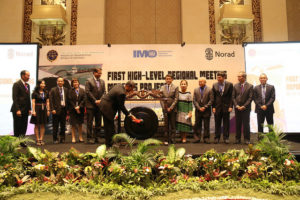 Seven countries in the Association of Southeast Asian Nations (ASEAN) have launched a four-year initiative to improve the environmental health of the seas in the region by implementing key marine environment protection treaties, according to the International Maritime Organization (IMO).
Seven countries in the Association of Southeast Asian Nations (ASEAN) have launched a four-year initiative to improve the environmental health of the seas in the region by implementing key marine environment protection treaties, according to the International Maritime Organization (IMO).
Senior decision makers of maritime administrations from Cambodia, Indonesia, Malaysia, Myanmar, the Philippines, Thailand, and Vietnam held their first high-level regional meeting in Bali, Indonesia from June 25 to 27, 2018 to kick-start the “Marine Environment Protection for Southeast Asia Seas (MEPSEAS) Project.”
The MEPSEAS project, to run from 2018 to 2021, will focus on enhancing the countries’ capacity to implement a number of high-priority treaties, including the International Convention for the Prevention of Pollution from Ships; the Anti-Fouling Systems Convention; the London dumping of wastes at sea convention and protocol; and the Ballast Water Management Convention.
IMO is implementing the project, with funding from the Norwegian Agency for Development Cooperation (Norad). The ASEAN Maritime Transport Working Group, the highest regional policy-making body dealing with maritime matters in the region, will act as the advisory body for the MEPSEAS project.
Opening the meeting, Agus H. Purnomo, director general for sea transportation under the Ministry of Transportation of Indonesia, said the MEPSEAS project provided an opportunity for the countries to tackle the risks the marine environment faced in the region and support sustainable growth in the maritime sector.
“We should work together to ensure a continued and strengthened contribution towards a green economy and growth and to protect our marine environment in a sustainable manner. Our active involvement through the MEPSEAS project will prove that we have the same commitment to protect our marine environment,” Purnomo said.
The meeting plans to agree on a project work plan and regional coordination and information-sharing arrangements.
The MEPSEAS project will promote national legal and policy developments and related capacity building in port and flag state inspections to support enforcement of the selected conventions.
It is also expected to support specific port biological baseline survey training, the Green Shipping-Green Port-Green Shipyards initiative of the Philippines, and the holding of a regional maritime technology conference, among other activities.
The MEPSEAS project will build on a previous IMO-Norad foundation project which directly led to six of the countries—Cambodia, Indonesia, Malaysia, the Philippines, Thailand, and Vietnam—making substantial progress in implementing or acceding to IMO environmental treaties.
The latest country to join the project is Myanmar, which aims to initiate actions to accede to and implement two marine environmental conventions in the near future. For countries which have acceded to the relevant treaties, the new MEPSEAS project will allow them to focus on effective implementation.
Photo courtesy of IMO





